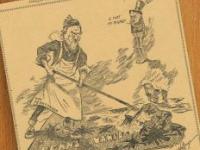Note from the Editor
by Tamara Gaskell
Window on the Collection
by Christopher Munden
A Political Challenge: Reformers, Republicans, and the Black Vote in 1890s Philadelphia
by Julie Davidow
"Good City Government is Good House-Keeping": Women and Municipal Reform
by Melanie S. Gustafson
What Do You Call a Savvy, Honest Democratic Machine Leader—Other than Rare? David L. Lawrence of Pittsburgh
by Kenneth J. Heineman
Dilworth, Clark, and Reform in Philadelphia, 1947-1962
by John M. McLarnon and G. Terry Madonna
Teachers' Page: Creating a Merit System for Pennsylvania: A Long and Winding Road
by Benjamin Danson
Teachers' Turn: Renewal, Reinvention, and Reform in Pennsylvania Politics
by Benjamin Danson
Legacies for Kids: Book Reviews
by Sarah Stippich
Book and Website Reviews
by Christopher Munden
Food for Thought: Does Political Reform Exist?
by Richardson Dilworth
Image: “Inauguration Day Outlook—Prospects of a Cleaning Up,” political cartoon from unidentified newspaper, ca. Jan. 1903, depicting Pennsylvania’s newly elected Republican governor, Samuel Pennypacker, cleaning up the state. Pennypacker, who served as president of the Historical Society of Pennsylvania from 1900 until 1916, was elected governor of Pennsylvania in 1902, defeating Democrat Robert Pattison. Though a cousin of Republic political boss Matt Quay (who, it was suspected, helped Pennypacker win the Republican nomination by buying votes), Pennypacker received the endorsement of reformer Theodore Roosevelt and promoted Progressive reforms. During his tenure he signed into law the Child Labor Act of 1905, created the Pennsylvania State Police, appointed Pennsylvania’s first commissioner of forestry, signed legislation establishing the State Museum, and taxes out-of-state coal companies operating in Pennsylvania to pay for thousands of miles of roads in the state. Hampton L. Carson Papers.


